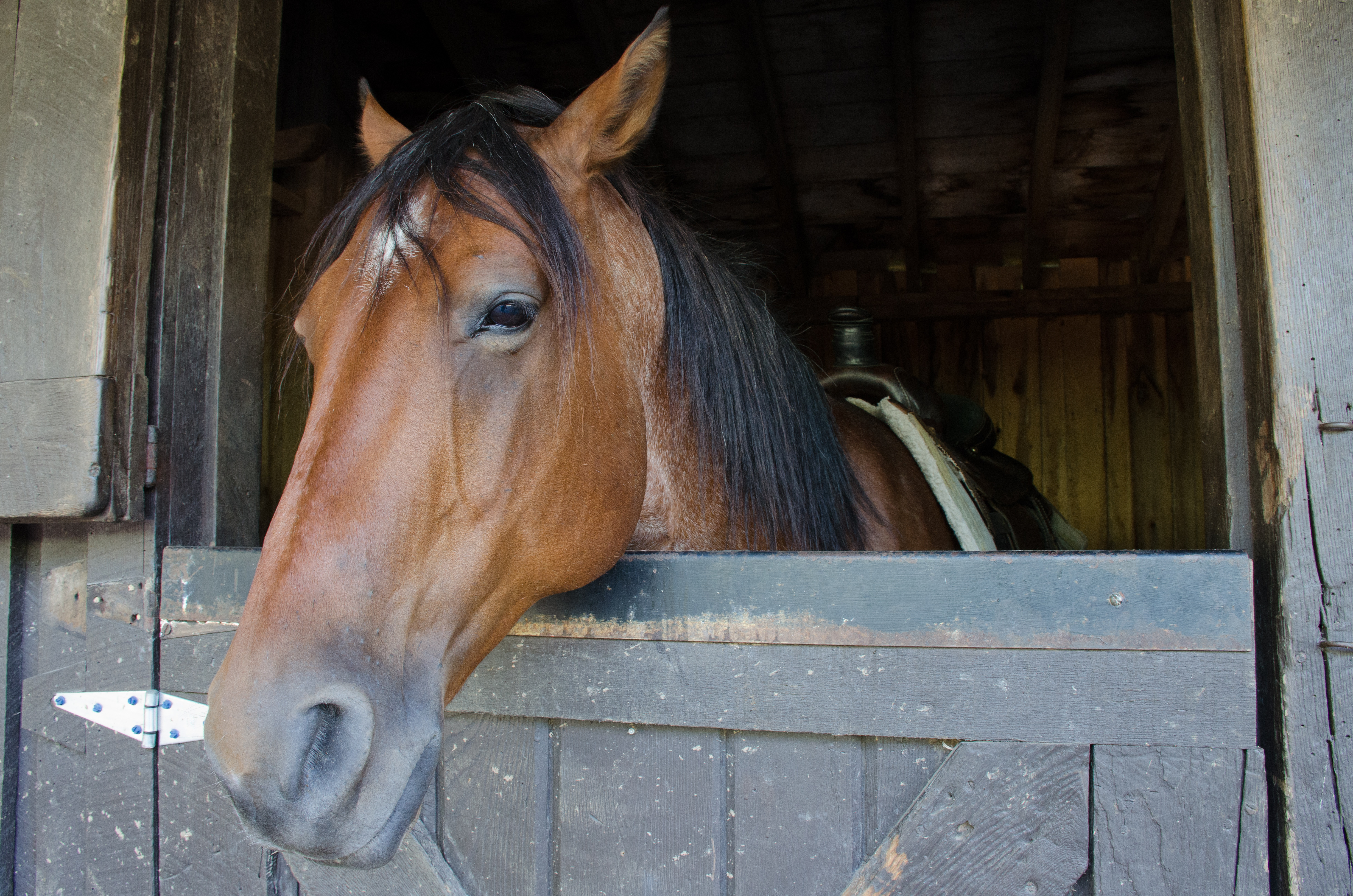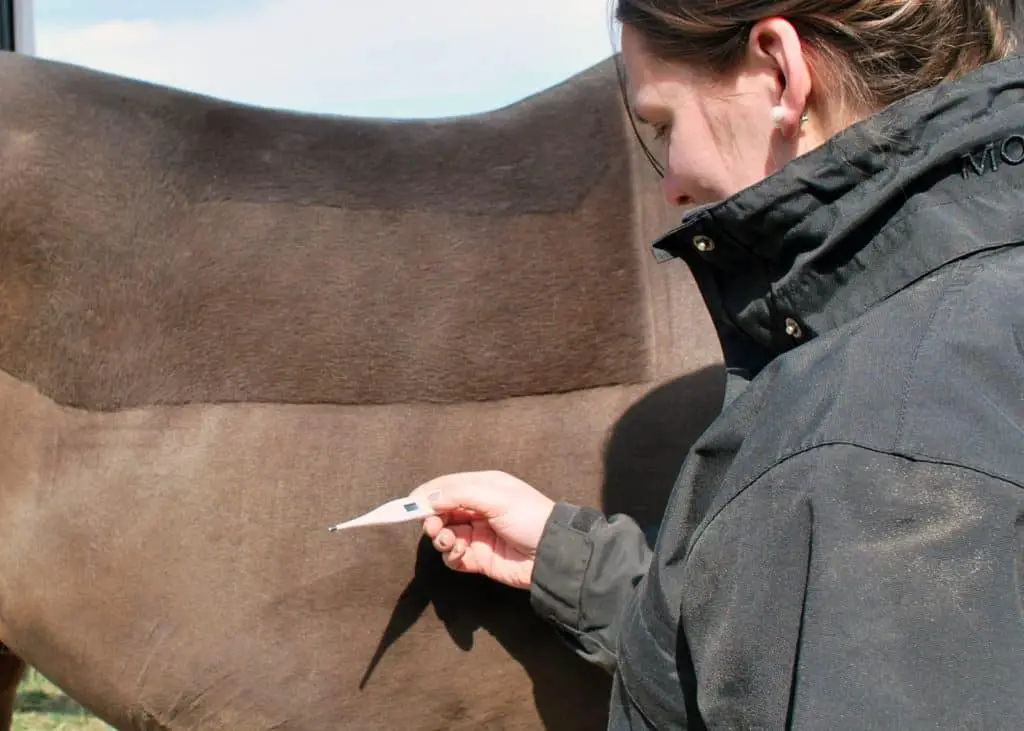Imagine you’re standing in the stable, and you notice something unusual. Your horse seems more sluggish than usual, and its coat lacks its usual sheen.
Concern grips you as you touch its forehead and feel the heat. You’re dealing with a fever in your beloved horse, and suddenly, the questions start swirling in your mind. What does this mean? Should you be worried? How can you help your horse recover quickly and safely?
Fevers in horses can be a puzzling and alarming experience for any horse owner. But don’t worry—you’re not alone in this. This article will guide you through everything you need to know about fevers in horses, from identifying symptoms to understanding potential causes and effective treatments. By the end, you’ll feel empowered and confident in caring for your horse, ensuring its health and happiness. Dive in to learn the essential facts and tips that will transform you into a knowledgeable and prepared horse guardian.

Credit: equinutritive.com
Causes Of Fevers In Horses
Bacterial infections, viral illnesses, or inflammation often cause fevers in horses. Stress and dehydration can also lead to elevated temperatures. Identifying the underlying issue is crucial for effective treatment.
Understanding the causes of fevers in horses is crucial for maintaining their health and well-being. Fever is often the body’s response to various underlying issues. Recognizing these causes early on can help you take timely action and prevent complications. But what exactly triggers a fever in your equine friend? Let’s dive into some of the common causes.
Infections And Illnesses
Infections are a common cause of fevers in horses. Bacterial infections, such as pneumonia or strangles, can quickly elevate a horse’s body temperature. Viral illnesses, like equine influenza, also lead to fevers as part of the body’s natural defense mechanism. Parasites can be another culprit. An infestation can cause systemic infections, resulting in a fever. Monitoring your horse’s environment and ensuring they receive regular veterinary check-ups can help you catch these issues early.
Environmental Factors
Temperature extremes can cause stress and lead to fever in horses. Prolonged exposure to heat can result in heatstroke, while cold weather can lead to hypothermia, both of which can cause a rise in body temperature. Unclean or overcrowded living conditions can also contribute to fevers. Dusty environments or poor ventilation can exacerbate respiratory issues, leading to infection and fever. Ensuring a clean and comfortable environment is crucial for your horse’s health.
Stress And Physical Activity
Stress plays a significant role in the health of horses. A sudden change in routine or environment can cause stress-induced fevers. This might happen when moving a horse to a new stable or introducing them to new herd members. Excessive physical activity can also trigger a fever. Overworking your horse without adequate rest can lead to overheating. It’s important to balance work and rest, ensuring your horse has time to recover after intense exercise. Reflect on your horse’s daily routine and environment. Are there areas where stress or physical demands might be too high? Addressing these factors can help prevent fevers and maintain your horse’s overall health.
Symptoms Of Equine Fever
Horses with fever often show signs like elevated body temperature, lethargy, and loss of appetite. Rapid breathing and sweating might also occur. Recognizing these symptoms early can help manage the horse’s health effectively.
Understanding the symptoms of equine fever is crucial for any horse owner. Horses, like humans, can experience fevers as a response to infection or illness. Recognizing these symptoms early can make a significant difference in their recovery process. You might notice subtle changes in their behavior or more obvious physical signs. Let’s dive into the specifics.
Behavioral Changes
Horses are creatures of habit. When they begin acting out of character, it can be a sign something is wrong. A horse with a fever may become lethargic, showing less interest in activities they usually enjoy. They might stand apart from other horses or exhibit decreased appetite. It’s essential to observe their social interactions. Are they avoiding companionship or showing unusual aggression? These behavioral shifts can be early indicators of a fever.
Physical Signs
Physical symptoms are often more apparent. Check your horse for increased respiratory rates or labored breathing. A fever can also cause sweating without exertion, or in some cases, chills with a dry coat. Feel their skin for warmth, particularly around the ears and muzzle. Is their pulse elevated or do they have a rapid heart rate? These signs, combined with behavioral changes, can confirm your suspicion of a fever. By keeping a close eye on your horse’s habits and physical condition, you can catch fevers early. When was the last time you did a thorough check-up? Small changes can be significant, so trust your instincts and stay proactive in your horse’s care.
Diagnosing Fever In Horses
Identifying fever in horses involves checking for symptoms like increased temperature, lethargy, and reduced appetite. Regular monitoring and knowing normal temperature ranges can help detect issues early. Consulting a vet for persistent or high fever ensures proper treatment and care.

Diagnosing Fever in Horses Understanding how to diagnose a fever in your horse is crucial for their health and well-being. A fever might be your horse’s way of telling you something is wrong. But how do you know for sure? Let’s break it down.
Temperature Measurement
The first step in diagnosing a fever in horses is measuring their temperature. A normal horse’s body temperature typically ranges from 99°F to 101.5°F. If your horse’s temperature exceeds this, it’s a sign of a fever. To measure your horse’s temperature accurately, use a digital or mercury thermometer. Carefully insert it into the horse’s rectum and wait for the beep or the time indicated on the thermometer. Always use a lubricant to make the process smoother for your horse and ensure the thermometer is clean before and after use. Have you ever noticed your horse sweating more than usual or being less active? These are signals that you might need to check their temperature. Regular monitoring helps you become familiar with your horse’s normal temperature range, making it easier to spot abnormalities.
Veterinary Assessment
If you suspect a fever, it’s time to call your vet. A fever might be a symptom of various underlying issues, such as infections or inflammation. Early veterinary assessment can make all the difference. Your veterinarian will conduct a thorough examination and may ask about your horse’s recent behavior and any changes in their routine. They might suggest blood tests or other diagnostics to pinpoint the exact cause of the fever. Have you ever wondered why your horse suddenly seemed off or lost its appetite? Sometimes, these subtle changes are just as important as the fever itself. Sharing these observations with your vet can provide valuable clues. Diagnosing a fever is not just about taking a temperature reading. It’s about understanding your horse’s overall health and catching potential problems early. How well do you know your horse’s normal behavior and habits? Being observant and proactive can help ensure your horse stays happy and healthy.
Treatment Options
Treating a fever in horses requires a proper understanding of available options. Prompt treatment ensures the horse’s health doesn’t deteriorate. Different methods can help manage fever and its symptoms effectively. Below are some common treatment options for fevers in horses.
Medications
Medications are often used to reduce fever in horses. Non-steroidal anti-inflammatory drugs (NSAIDs) are commonly prescribed. These include phenylbutazone and flunixin meglumine. They help lower the fever and ease discomfort. Always consult with a vet before administering any medication. Incorrect dosages can harm the horse.
Home Remedies
Some home remedies can aid in managing a horse’s fever. Ensure the horse has plenty of fresh water. Hydration is key for recovery. Provide a shaded, cool environment to help lower body temperature. You can also use fans to improve airflow. Monitor the horse’s temperature regularly. If the fever persists, seek professional help.
Veterinary Interventions
Veterinary interventions might be necessary for severe cases. The vet will perform a thorough examination. They may conduct blood tests to identify underlying causes. Specialized treatments might be required based on findings. This could include antibiotics or other medications. Early intervention can prevent complications.
Preventing Fevers
Understanding fevers in horses is essential for maintaining their health. Regular checks and a clean environment can help prevent fevers. Watch for early signs to ensure timely care.
Preventing fevers in horses is crucial for maintaining their health and performance. A fever can be an early sign of infection or other health issues, and addressing its root causes is essential. By focusing on prevention, you can ensure your horse remains in peak condition and avoid unnecessary stress and medical costs.
Healthy Environment
Providing a healthy environment is key to preventing fevers in horses. Ensure your horse has access to clean, fresh water at all times. Dehydration can exacerbate fever conditions. Maintain clean stables and paddocks. Remove manure and waste regularly to reduce the risk of infections. Good ventilation is also important to prevent respiratory issues that can lead to fevers. Consider your horse’s diet. A balanced diet that includes the necessary vitamins and minerals supports a strong immune system. Regularly assess their feed and consult a nutritionist if needed.
Regular Veterinary Care
Regular veterinary care plays a pivotal role in preventing fevers. Schedule routine check-ups to catch any health issues early. A vet can provide vaccinations and deworming programs tailored to your horse’s needs. Monitor your horse’s health daily. Note any changes in behavior, appetite, or energy levels. Early detection of these signs can prevent a minor issue from escalating into a fever. Build a relationship with your vet. Open communication ensures you get timely advice and support. Have you ever wondered how much stress you could save by catching a problem early? Regular vet visits are a small investment with significant returns.
When To Call A Veterinarian
Monitoring a horse’s health is crucial. Fevers can signal underlying issues. Knowing when to call a veterinarian is vital for your horse’s wellbeing. Prompt attention ensures quick recovery and prevents complications.
Signs Of Serious Illness
Recognize signs that need urgent care. A horse with a high fever over 103°F is concerning. Check for lethargy or refusing food. Observe breathing difficulties. Swelling or heat in limbs can indicate infection. Any unusual behavior warrants a vet’s attention.
Persistent Symptoms
Symptoms lasting more than 24 hours need a vet’s evaluation. Persistent coughing or nasal discharge is alarming. Continued diarrhea or colic signs require professional help. Long-lasting limping or lameness needs immediate care. Do not wait if symptoms persist.
Impact On Horse Health
Fevers in horses can indicate infections, inflammation, or other health issues. Elevated temperature affects their comfort and performance. Recognizing and managing fevers promptly is vital for maintaining horse health and well-being.
Understanding the impact of fevers on horse health is crucial for any horse owner. Horses, like humans, can experience a variety of symptoms when they run a fever. Recognizing these effects helps you provide better care and make informed decisions about their health.
Short-term Effects
In the short term, a fever can cause your horse to feel weak and lethargic. You might notice a decrease in appetite and energy. This is because their body is working hard to fight off an infection or illness. A higher body temperature can lead to dehydration. Make sure your horse has constant access to fresh water. Check for other symptoms like shivering or sweating, which indicate your horse is trying to regulate its body temperature. A personal experience I had involved a horse that suddenly became less responsive during rides. After taking its temperature, I realized the horse was running a fever. Addressing this promptly prevented any further complications.
Long-term Consequences
If not addressed, recurring fevers can lead to more serious health issues. Chronic fevers might signal underlying conditions that need veterinary attention. Ignoring these symptoms could result in long-term damage to your horse’s organs. A horse with frequent fevers might develop a weakened immune system. This makes them more susceptible to infections and diseases. It’s essential to monitor your horse’s health closely and consult a vet if fevers persist. Have you ever wondered how often you should check your horse’s temperature? Regular monitoring can prevent minor issues from becoming serious problems. Consider investing in a reliable thermometer and keep track of any changes in temperature. Your horse’s health is in your hands. By understanding the impact of fevers, you can take proactive steps to ensure their well-being. Prioritize their health, and they will reward you with loyalty and vigor.

Credit: equusmagazine.com
Myths And Misconceptions
Fevers in horses often lead to myths and misconceptions. Many owners misinterpret symptoms, causing unnecessary panic. Understanding the true signs helps in providing accurate care and ensuring horse health.
Fevers in horses can be puzzling, especially when myths and misconceptions cloud your understanding. Many horse owners, especially new ones, find themselves relying on age-old beliefs that may not be entirely accurate. These myths can lead to unnecessary panic or, worse, inadequate care. It’s crucial to separate fact from fiction to ensure your horse gets the best care possible.
Common Beliefs
A frequent misconception is that a fever always indicates a severe illness. While a fever can be a sign of an underlying issue, it is not always a dire situation. Fever is a natural response that helps the body fight off infections. Some believe that if one horse has a fever, all horses in the barn will get it too. This is not always true. Fevers can be caused by non-contagious conditions such as inflammation or stress. Another myth is that you should always attempt to lower a horse’s fever immediately. This can sometimes do more harm than good. Understanding when to intervene and when to let the fever run its course is vital.
Scientific Clarifications
Scientifically, a horse’s normal body temperature ranges from 99°F to 101.5°F. Anything above this could be considered a fever. However, slight variations can occur due to environmental factors or exercise. Not all fevers are caused by infections. Horses can develop fevers due to non-infectious diseases, stress, or even after vaccinations. Recognizing the root cause is more critical than the fever itself. Fevers are not inherently harmful and can be a beneficial response by the body. They help in activating the immune system to fight off pathogens. Always consult a vet before deciding on treatment to avoid unnecessary interventions. Have you ever considered how your perception of a fever might affect your horse’s treatment? Misunderstandings can lead to misguided actions. Equip yourself with knowledge, and always question the common beliefs against scientific facts. This approach ensures your horse’s well-being remains your top priority.
Frequently Asked Questions
What Causes Fevers In Horses?
Fevers in horses can result from infections, inflammations, or illnesses like equine influenza. Other causes include bacterial or viral infections, stress, and environmental factors. Identifying the root cause is essential for proper treatment.
How To Check A Horse’s Temperature?
To check a horse’s temperature, use a digital rectal thermometer. Lubricate it and insert gently. Wait for the beep to ensure an accurate reading. A normal temperature ranges between 99°F to 101. 5°F.
When Should I Call A Vet For A Fever?
Call a vet if the fever exceeds 102°F or persists for more than 24 hours. Other concerning symptoms include lethargy, loss of appetite, or abnormal behavior. Quick veterinary intervention can prevent complications.
Can Fevers In Horses Be Treated At Home?
Mild fevers can often be managed at home with rest, hydration, and monitoring. Provide shade and fresh water. However, persistent or high fevers need professional veterinary care for accurate diagnosis and treatment.
Conclusion
Fevers in horses require careful attention. Early detection is vital for health. Monitor temperature changes consistently. Observe behavior for unusual signs. Contact a veterinarian for advice. Proper treatment prevents complications. Ensure horses have clean water always. Maintain a balanced diet for overall health.
Regular check-ups keep horses safe. Knowing fever symptoms helps in timely action. Protect your horse’s wellbeing with awareness. Keep your equine friend healthy and happy. Be proactive in managing their health. Small steps make a big difference. Stay informed and prepared.
Your horse depends on you.






